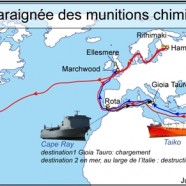Robin des Bois’ viewpoint on the importation of HCB from Australia to France
Robin des Bois was consulted by Orica over the possible treatment, at Trédi’s incinerator at Salaise-sur-Sanne (France), of HCB waste stockpiled, since 1991, in Botany situated 8km from Sydney. Two representatives from Robin des Bois gathered information on site at the end of 2013 in order to understand why an industrial firm, located in Australia, an economically developed country, would want to export waste 17,000km away.
It was noted that the 13,800 tonnes of waste is stockpiled in a highly urbanised area. The Botany stockpile is exposed to natural and industrial external threats. The HCB concentration of the stockpile ranges from 0.003% to 89%. Certain waste requires repackaging every 4-5 years. Repackaging operations increase the total weight of the waste by 2.0% on average, per annum. Orica’s stockpile is historical and HCB is no longer produced in Australia.
Destruction of Syrian Chemical Weapons n°4
Since the beginning of the year two vessels, loaded with agents for chemical weapons, have been rocking and rolling in the Eastern Mediterranean Sea. There exact location is confidential. The Ark Futura is a 180 meter long RoRo ship operating under the Danish flag. The crew is multinational. The Taiko is a 262 meter long RoRo ship operating under the Norway International flag. In the case of a collision or fire this type of vessel, which can be likened to a floating parking lot, is very vulnerable and will sink quickly.
Destruction of Syrian Chemical Weapons n°4
Since the beginning of the year two vessels, loaded with agents for chemical weapons, have been rocking and rolling in the Eastern Mediterranean Sea. There exact location is confidential. The Ark Futura is a 180 meter long RoRo ship operating under the Danish flag. The crew is multinational. The Taiko is a 262 meter long RoRo ship operating under the Norway International flag. In the case of a collision or fire this type of vessel, which can be likened to a floating parking lot, is very vulnerable and will sink quickly.










